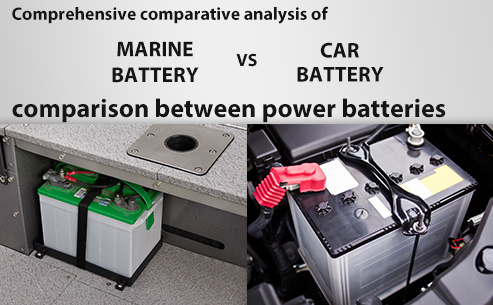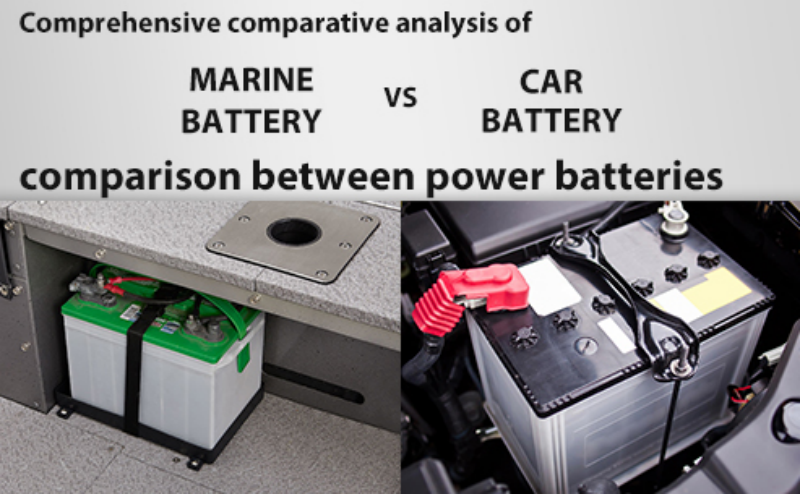
Main content:
- What is special about a marine battery?
- Is a marine battery the same as a deep cycle battery?
- What is a car battery?
- Are marine and car batteries the same?
- Can I use a marine battery as a car battery?
- Differences between a marine battery vs car battery
- Frequently asked questions about marine battery vs car battery
- Is it okay to use a deep cycle battery in your car?
- Can you recharge a dead marine battery?
- How often should you charge a marine battery?
- Can you use a 12v marine battery in a car?
- Is a marine battery stronger than a car battery?
- Conclusion
Understanding the differences between marine battery vs car battery as well as their uses is important. Not only does it help you select the ideal battery that’ll power your devices efficiently, but also helps you understand how best to maintain your ideal battery.
This article is designed to help you understand the following:
- What are marine batteries and how they function.
- What are car batteries as well as how they function.
- The differences between these two batteries.
- How to care for your marine battery as well as a car battery.
Let’s dig right in!
1.What is special about a marine battery?
First things first - it would be best if you’d first understand what a marine battery is and how it functions. A marine battery is used to crank your boat’s engine as well as power other auxiliary devices. In addition, marine batteries can also be used for energy storage. Marine energy storage systems can significantly improve the operating efficiency of ships, and have many advantages such as high capacity, high reliability, high flexibility, and strong environmental adaptability.
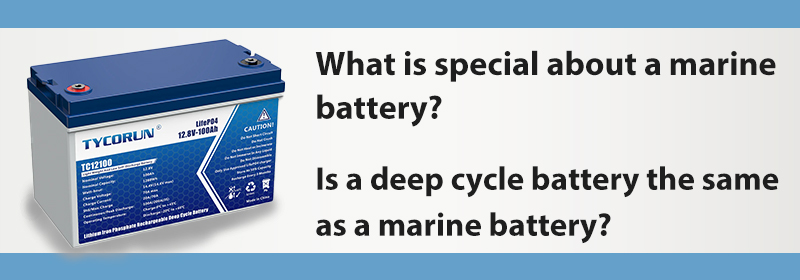
Lithium-ion batteries are often used in the field of marine energy storage due to their high specific energy, good charge-discharge characteristics, long cycle life, and maintenance-free. There are three types of marine batteries - each type is classified according to its purpose. Check them out:
- Starting marine battery - this battery type is primarily used to start your boat’s engine by supplying it with a lot of power at once - discharging big amps in a short duration.
- Deep cycle marine battery - this type of battery is primarily used to power your boat’s auxiliary devices (such as the sound system, navigation, etc.). They are called deep cycle batteries because theyare designed to be regularly deeply discharged using most of its capacity to a depth of discharge greater than 80%. Compared with FLA and AGM battery, the average cycle life of deep cycle lithium ion battery is generally longer (up to 4,000 cycles).
- Dual-purpose marine battery - a dual-purpose marine battery combines both the functionalities of a starting and deep cycle marine battery.
So you might be thinking to yourself, “What makes marine batteries special?” Here’s what: Unlike regular car batteries, marine batteries are special because they are designed to withstand a lot of vibration as well as wave pounding while powering your boat. If the same environmental conditions are to be subjected to a regular car battery, then its internal components would crack due to the vibrations and wave pounding, causing permanent damage to that battery. A common question that most people ask is whether a marine battery is the same as a deep cycle battery.
2.Is a marine battery the same as a deep cycle battery?
No - not all marine batteries are deep cycle and not all deep cycle batteries are marine batteries. As mentioned above, marine batteries can be roughly divided into three categories, and deep cycle marine batteries are just one type of marine batteries.
3.What is a car battery?
Car batteries can also be divided into starting batteries and deep cycle (ie power batteries). A starting battery, as the name suggests, is a rechargeable type of battery that is used to start your car’s engine. The power battery is the power source that provides the power source for the tool, and mostly refers to the battery that provides power for electric vehicles, electric trains, electric bicycles, and golf carts.
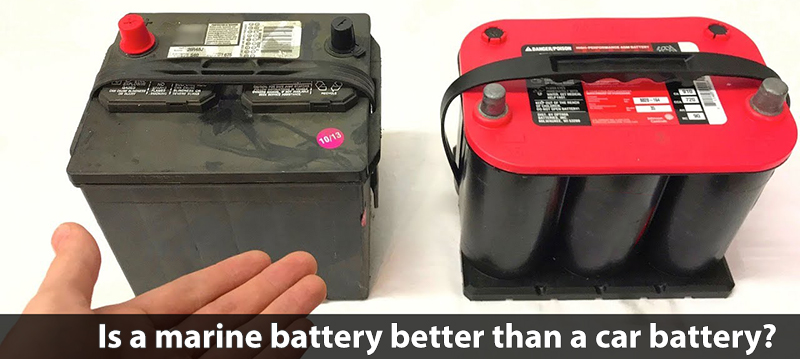
4.Are marine and car batteries the same?
No - marine and car batteries are not the same. Here’s why: While both batteries are designed to power your boat or car, their internal structure is not the same. Marine batteries have a stronger internal structure designed to withstand vibration and wave hits.
5.Can I use a marine battery as a car battery?
It depends on the specific car battery. Marine batteries cannot be used as electric vehicle batteries because the voltage and capacity of electric vehicle batteries are generally larger than marine batteries. If you want to replace golf carts, electric bicycles, electric motorcycles and other batteries with marine batteries, as long as the voltage and capacity are equal and the size can be adapted, they can be interchanged.
6.Differences between a marine battery vs car battery
Check out the differences between a marine battery vs. car battery in tabular form:
|
Attribute |
Marine battery |
Car battery |
|
Classification |
Starter, deep cycle, dual-purpose |
Starting and power batteries |
|
Internal structure |
Thicker plates than car battery |
Thinner plates than marine battery |
|
Application |
Primarily used to power boats and can also be used in cars |
Primarily used to start car engines or power source for tools |
|
Voltage |
14.2V - 14.4V |
12.8V |
7.Frequently asked questions about marine battery vs car battery
① Is it okay to use a deep cycle battery in your car?
Deep-cycle batteries are also capable of delivering inrush current, but not as powerful as those provided by car batteries. In the car battery, the power battery is also a deep cycle battery, although it cannot start the engine, it can provide power for driving.
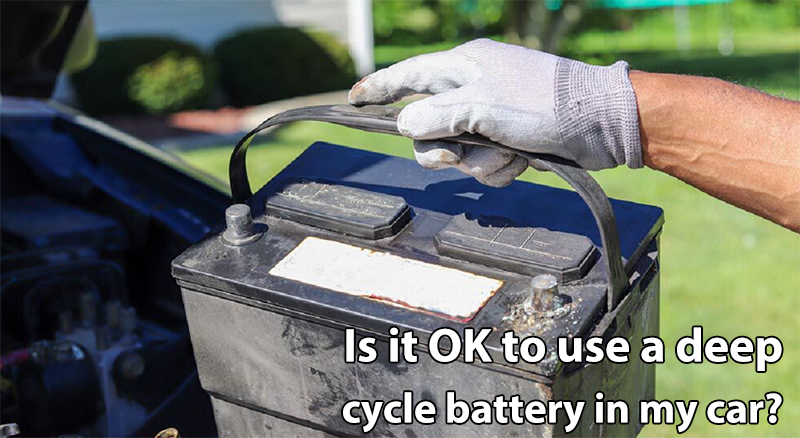
② Can you recharge a dead marine battery?
Yes, marine batteries are rechargeable, similar to car batteries. It is important to know the type of marine battery you have as well as its chemical composition. If you have a lithium marine battery, recharging it should not be a complicated process compared to a lead-acid marine battery. Lithium marine batteries cannot overcharge as they have a cut-off circuit board that prevents overcharging and over-discharging.
However, lead-acid marine batteries need a smart charger that will detect when the battery is fully charged and discontinue charging. If you do not have a smart charger, a traditional one will still work. You’ll, however, need to ensure that the battery does not overcharge as it could easily get damaged.
③ How often should you charge a marine battery?
It depends on the chemical composition of your marine battery. If you have a lithium marine battery, it would be best if you’d charge them after every use. Lithium marine batteries have a longer lifespan. However, if you have a lead-acid marine battery, it would be best if you'd recharge them after every 30 days. In addition to that, consider acquiring a smart charger that will help you charge your lead-acid marine batteries without the fear of overcharging batteries.
④ Can you use a 12v marine battery in a car?
This depends on the situation, 12V marine batteries can be used as electric bicycles, electric motorcycles and golf cart batteries and cannot be used in electric vehicles, but they also need to be suitable when the voltage and capacity are equal and the size is suitable.
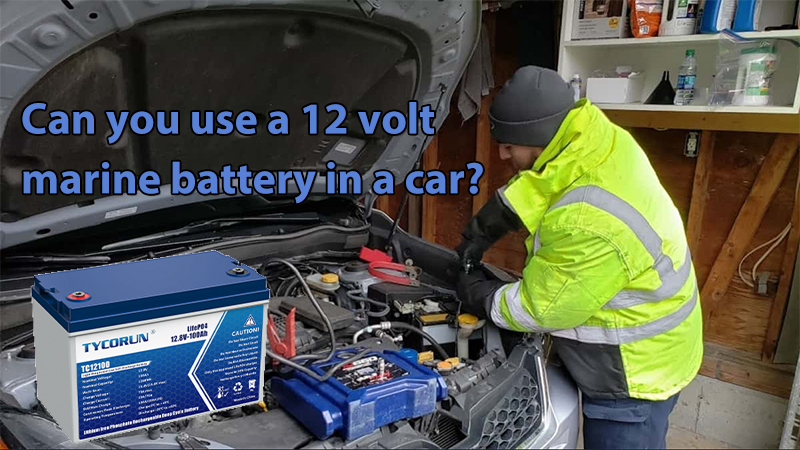
⑤ Is a marine battery stronger than a car battery?
Marine batteries have thicker packaging panels than regular car batteries. Thicker plates translate to more power coming from the batteries as they discharge. It, therefore, means that marine batteries are stronger (both in current delivery and in structure) than car batteries. Remember, marine batteries can withstand a lot of vibration and wave pounds, unlike car batteries which are designed to be used on smooth and slightly rough roads.
8.Conclusion
In summary, marine batteries and car batteries are quite different from each other. Marine batteries are stronger - they can deliver more power as well as withstand rough environments (vibrations and wave pounds) - and that is what makes a marine battery special. It is important to note that there are three types of marine batteries - starter, deep cycle, and dual-purpose, and they also can be used as golf cart batteries. Car batteries also have two types: power batteries and starting batteries, and power batteries are also deep cycle batteries.
Taking care of your batteries is important. One of the key activities involved in taking care of your batteries is charging them. Both marine and car batteries are rechargeable. If you own a lead-acid marine or car battery, you’ll need to ensure that the battery does not overcharge and over-discharge. Lead-acid marine batteries should be charged after every 30 days. If you have a lithium marine battery, it would be best if you’d recharge it after use.


